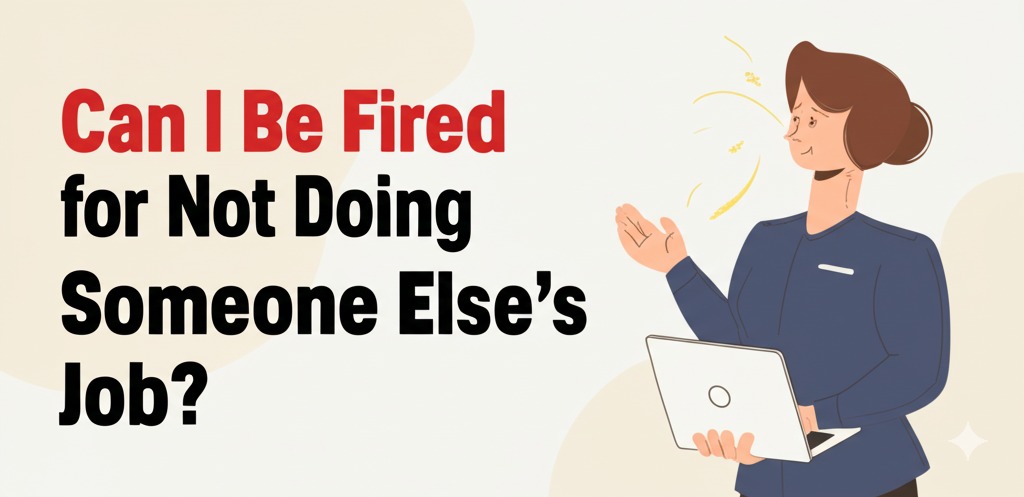
In the workplace, job expectations can sometimes become blurred, leading to confusion and frustration. One common question employees often ask is, “Can I be fired for not doing someone else’s job?” It’s a legitimate concern that touches on workplace boundaries, job roles, and even employee rights. In this article, we’ll break down the key factors that can influence whether or not you’re at risk of termination for not picking up the slack for someone else.
What Does “Doing Someone Else’s Job” Mean?
Before diving into the potential consequences, it’s important to define what “doing someone else’s job” actually means. This could include taking on tasks that fall outside your job description, stepping in for a colleague who is absent, or assuming responsibilities that are not part of your regular duties. While helping out in a team environment is often expected, how far does this responsibility extend, and when is it appropriate to say “no”?
The Difference Between Teamwork and Overstepping Boundaries
There is a fine line between being a supportive team player and being taken advantage of. Teamwork is crucial for any business, and going above and beyond can be a great way to showcase your skills and loyalty. However, when you’re consistently asked to do someone else’s work, it can lead to burnout, resentment, and potentially even legal issues if you are being unfairly burdened.
Understanding Your Job Description and Employer Expectations
Your job description is your primary defense. This document outlines your primary responsibilities, tasks, and the scope of your role. If you are asked to take on tasks that go beyond what was agreed upon in your contract, it’s essential to know where you stand. Here’s how understanding your job description can protect you:
- Know Your Boundaries: If the task in question isn’t part of your job description, you may be well within your rights to decline.
- Clear Communication: Discuss the scope of your role with your manager to clarify expectations.
- Document Everything: If you’re asked to take on additional tasks, ensure that these requests are documented. This can help protect you in case any misunderstandings arise later.
Can Your Employer Force You to Do Someone Else’s Job?
In most cases, your employer has the right to ask you to perform tasks related to your job, but there are limitations. If you’re being asked to do work that doesn’t align with your position, it could be considered an abuse of power. Some factors to consider:
- Employment Contract: If your contract includes language about flexibility in duties or a “catch-all” clause, your employer may have more leeway.
- Industry Standards: In some industries, cross-training and taking on additional roles are part of the job culture, and it’s expected that employees assist in various capacities.
- Workplace Culture: In a collaborative and fluid work environment, taking on additional duties might be a norm. However, this should still be within reasonable limits.
Legal Protections for Employees
If you are being asked to do someone else’s job repeatedly and it’s affecting your well-being or performance, there are legal protections in place for employees in many countries. Here are a few points to keep in mind:
- Employment Laws: In some jurisdictions, employers cannot ask you to perform duties that are significantly outside your job scope without additional compensation.
- Harassment or Discrimination: If the task involves a situation where you feel discriminated against or harassed, it’s important to report it to HR or seek legal advice.
- Unionized Workplaces: If you’re part of a union, the collective bargaining agreement may have specific clauses about job duties and workload.
When Saying “No” Is Not an Option: What to Do If You Feel Forced to Take on Extra Work
There may be times when you’re expected to step in for a colleague due to illness, absence, or vacation, and refusing to help out could negatively impact your team. However, it’s important to distinguish between a reasonable request and an unfair burden.
Steps to Take If You Feel Overburdened
- Evaluate the Request: Is the request reasonable? Are you equipped to handle the extra task without sacrificing your own work?
- Have a Discussion: Approach your supervisor or HR to express your concerns. Be honest about your workload and any difficulties you’re facing.
- Set Boundaries: Politely set limits on how much additional work you’re willing to take on. Clarify your role and what you’re responsible for.
- Negotiate Compensation: If you are consistently asked to take on extra tasks, consider negotiating for additional pay or time off.
The Consequences of Refusing to Do Someone Else’s Job
While refusing to do someone else’s job might not automatically lead to termination, it could have consequences depending on your workplace culture and the nature of the request. Here are some potential outcomes:
- Tension with Colleagues: If you’re viewed as unwilling to help, it could strain your relationship with coworkers, even if you’re in the right.
- Performance Reviews: Consistently refusing to assist could impact your performance evaluation if it’s seen as lacking teamwork or flexibility.
- Disciplinary Action: In some cases, if the refusal to take on additional work becomes a pattern, it might result in formal warnings or other disciplinary actions.
Conclusion: Know Your Rights and Set Clear Boundaries
In conclusion, whether you can be fired for not doing someone else’s job depends on several factors, including your employment contract, the company culture, and legal protections in place. It’s important to communicate clearly with your employer, set boundaries, and understand your rights. While occasional flexibility in the workplace is expected, it’s essential that your workload remains manageable and in line with your job description. If you ever feel that you’re being unfairly burdened, don’t hesitate to have an open conversation with your supervisor or seek legal advice.
If you’re unsure about your specific situation, take a moment to review your job description, communicate openly with your manager, and consider seeking guidance from an employment expert or union representative. Ultimately, protecting your well-being and job satisfaction should be a top priority.

Andre Cuevas provides career insights, job search strategies, and professional advice to help individuals navigate the job market and achieve their career goals.





